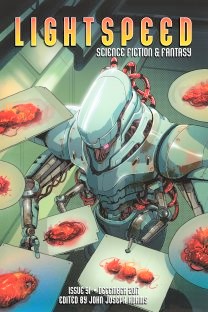“The House at the End of the Lane Is Dreaming” by A. Merc Rustad
Reviewed by Robert L Turner III
“The House at the End of the Lane Is Dreaming” by A. Merc Rustad is an interesting take on the Role Playing Game (RPG) computer game genre. Alex, the protagonist, keeps reliving the same disastrous day and gradually comes to realize that she is part of a computer game. She decides to rebel. Rustad’s writing is decent, if overly adjective laden, and the idea is interesting. For thematic purposes the entire narration is dark and violent with the ending being particularly so. The problem is that the idea of embedded multiple-layer reality has been done many times, notably in Baldur’s Gate II: The Throne of Baal. Ultimately, this makes the story a solid contribution, but not a particularly noteworthy one.
“The Greatest One-Star Restaurant in the Whole Quadrant” by Racheal K. Jones is a very clever piece and worth your time. A rogue ship full of escaping cyborgs is attempting to pass through human space when they receive an order for Salisbury steak. It turns out that they hijacked an interstellar food cart. In order to maintain the deception, the cyborgs must fulfill the order. This leads to more orders and the Engineer must scramble to provide options. The story is a fresh twist on the body horror/cannibalism subgenre and provides a very interesting commentary on obsession and perspective. Jones has managed a challenging balance between humor and theme and has produced a winner.
“A Third of the Stars of Heaven” by Cadwell Turnbull is set in the near future where an alien species, the Ynaa, have arrived and brought new technology with them. Henrietta, a grandmother on the island of St. Thomas, has cervical cancer, but refuses to take the nano-synthetic organisms provided, based on an experience from her childhood and her faith. While the story itself is simple, the world building is nuanced and mature with a well-balanced meditation on the nature of change, technology, and colonialism. It shares elements of Octavia Butler’s Lilith’s Brood trilogy as Turnbull asks the question, “To what degree do we sacrifice our beliefs for progress?” Based on the blurb Lightspeed includes, I hope that his novel-in-progress is an expansion of this idea.
“You Will Never Know What Opens” by Mari Ness is less a story and more an allegory of the life of a writer. The protagonist “you” in the second person narration, has a bad habit of falling through doors into other worlds. Some are full of wonder, some danger, and some both. As a result, “you” live a life on the margin, never quite fitting in. The story is short and the imagery is good. I am uncertain of what it says that it also works as an allegory for mental illness.
Robert Turner is a professor and longtime SF/F fan.
 Lightspeed
Lightspeed